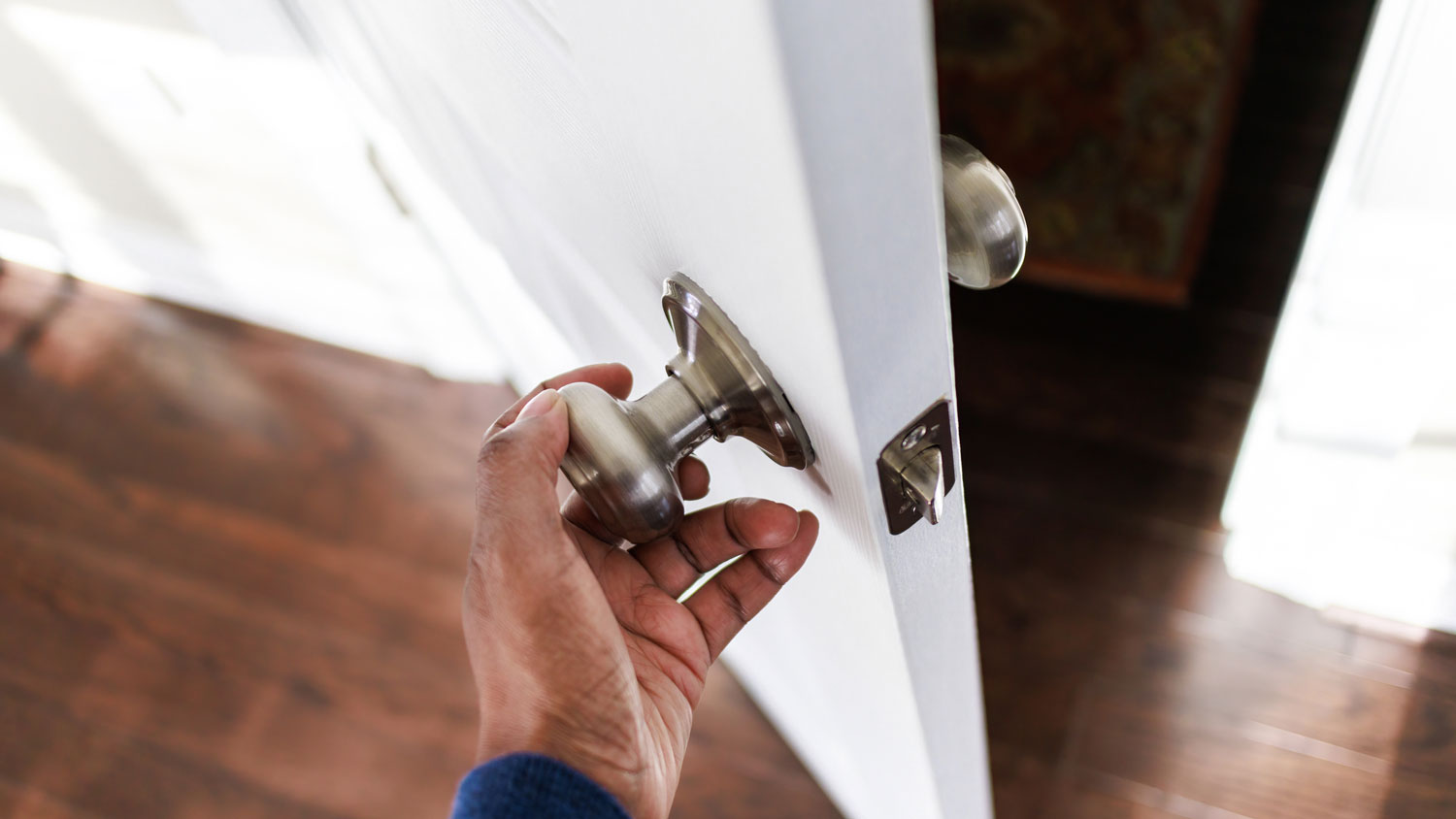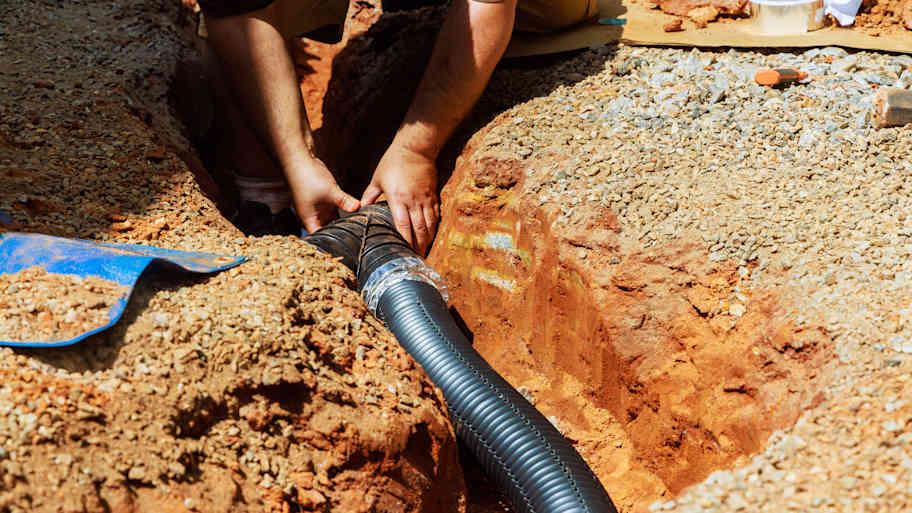
Staying ahead of foundation problems can save you time and effort. Learn how much foundation inspections cost and what affects how much you’ll pay.
What to do when you have a sinking feeling about the state of your foundation


A sinking foundation happens when the layers of soil under a home can no longer handle the home's weight.
Visible cracking on the walls inside your home is one of the telltale signs of a sinking foundation.
Sinking foundations can also impact everything from your floors to your plumbing.
The cost to repair a foundation is between $2,100 and $7,800.
You can prevent foundation sinking using landscaping and maintenance.
While it's common knowledge that houses can settle over time, signs of a sinking foundation can't be brushed off. Homes rest on several layers of soil. When soil can no longer handle the weight of your home, your foundation will begin to settle into the earth. When ignored, a sinking foundation compromises the structural integrity of your home. While foundation experts are needed to assess and repair a sinking foundation, homeowners can often spot sinking foundation signs on their own. Here's a guide to help you detect the signs.
Recognizing early warning signs is important, but figuring out the right fix isn't always simple. Delaying professional help or attempting complex DIY repairs can lead to further damage and increased costs. With our network of local pros, you can hire a skilled professional to assess the issue and recommend the best solution.
A sinking foundation can endanger the structural integrity of your entire home, posing serious safety risks and creating damage throughout the house. A sinking foundation can also damage utility lines that run under the house, potentially leading to plumbing problems or gas leaks. When a foundation sinks, it can cause separation of walls, ceilings, and the roof, which can all result in leaks and water damage.
A sinking foundation may not be immediately obvious, but there are signs you can look for that indicate your foundation might be sinking. While some of these signs may have various causes, it’s worth hiring a pro who inspects foundations to pinpoint the problem if you come across any of these issues.
You may think that your mind is playing tricks on you if you're noticing a slight lean to your floor. The best way to confirm an uneven floor is the "ball check." Simply place a ball on the floor to see if it rolls across the room on its own.

While there are many causes for sticking doors, one of them is poor foundation settlement. This happens when pressure from a sinking foundation warps door frames.
Uneven water pooling is a little-known sign of a sinking foundation. You might also notice poor drainage with pipes that seems to happen out of the blue. Unexplained plumbing problems are often caused by the pressure of a sinking foundation pinching pipes.
Cracks in walls, window frames, and door frames can all be telling you to check your foundation. While not all cracks are caused by foundation issues, drywall cracks that are visible around the corners of your windows and doors are often related to your foundation. You'll notice that cracks quickly reform after repairs. In addition to spotting cracks, you may also see nails popping out of drywall and frames.
This common foundation problem pops up in bathrooms and kitchens. Check for any gaps between cabinets and countertops. These gaps show that your home's sinking foundation is pulling the floors down with it. In some cases, you may also notice that cabinets are separating from your walls.
This is the most overt sign of a sinking foundation. If you suspect that your foundation is sinking, it's important to inspect it to look for the types of foundation cracks to be concerned about. Look in your basement for cracks that have formed along the floor, interior walls, or exterior walls. If you have a slab home, you can look at the ground-level floors to check for cracks.
While you may be paying attention to your foundation for the first time because you've noticed some classic sinking foundation signs, homeowners should actually inspect their basement, crawl space, garage, and unfinished areas to regularly look for damage.
Call in a pro when you spot any of the above signs of damage. A foundation contractor will be able to assess the problem and let you know what repairs are necessary. Even if it turns out your foundation isn’t sinking, any foundation damage should be promptly repaired to prevent further issues. Your contractor will be able to advise you on the best foundation repair method for your problem so your house can be on solid ground again.
Foundation repair is not something to tackle as a DIY project. Hiring a foundation contractor ensures that the repair is performed correctly, safely, and in compliance with any applicable codes or regulations. In many cases, large, specialized equipment may be required to fix your foundation. The foundation keeps your home safe and sturdy, so you don’t want to take any chances with DIY repairs.

It’s a good idea for homeowners to stay ahead of foundation issues by making some small changes to their homes. If you're worried that you're at risk for a sinking foundation, there are several preventive measures to take. Consider bringing in a local foundation repair pro to assess your home to ensure you're making the right choice.
Retaining walls protect a home's foundation by preventing soil from moving downsloping terrain. Retaining walls also divert water away from your home's foundation. When you hire a professional to build a retaining wall for you, they'll take the grading around your home into consideration to create a custom design.
If you have clay-rich soil under your home, this soil type is more likely to cause sinking issues compared to dense soil. The reason why is because "thin" soil makes it much easier for your foundation to expand and contract in wet conditions. While replacing soil isn't usually an option, one popular remediation option is to use industrial-strength steel tubes to stabilize soil.
Pier systems use steel piers to connect your home's foundation to soil or bedrock below. In most cases, a foundation pier system can lift your home back to its original position. While pier systems can often be installed without disrupting your home and landscaping, this is a job for licensed professionals.
Updating your yard's landscaping to improve drainage in your terrain could save your foundation. Using grading, landscaping contractors will help you use gravity to your advantage to pull water away from the base of your home.
Once you have the right grade, you can use shrubs, flowers, and other forms of foundation planting around the home to protect your foundation in a cost-effective way that is also attractive. Many homeowners overlook the importance of greenery for protecting the top layers of soil around their homes from rain-related erosion and wind damage.
Your gutters and foundation are closely linked. The gutters on your roof aren't just there to protect your roof from mold and water damage. They also help to drive water away from your foundation. When you have leaves, twigs, and other types of debris piling up in your gutters, water will spill over your gutters to reach your foundation instead of being directed away to a safe area. The water that splashes over the tops of your gutters will eventually pool around your home's foundation.
Foundation repair costs often range from $2,100 to $7,800, but major repairs can cost up to $15,000 or more. If the damage is extensive enough to require a foundation replacement, it can cost $20,000 to $100,000.
Foundation replacement involves lifting the house, removing the original foundation, pouring a new foundation, and placing the house back on the foundation. This process can take weeks or longer, and you might not be able to live in your house during foundation replacement.
From average costs to expert advice, get all the answers you need to get your job done.

Staying ahead of foundation problems can save you time and effort. Learn how much foundation inspections cost and what affects how much you’ll pay.

Plumbing leaks are never fun, but they’re worse when they happen inside your foundation. Use this guide to slab leak repair costs to learn what to expect.

Foundation repair costs can be tricky when you have a large repair on your hands. This guide walks through costs from small cracks to total replacement.

Which pole barn foundation option is best for your area and the size of the pole barn you’re building? Check out five of the most commonly used options.

Wondering what weeping tile is? With the unique and somewhat confusing name, you’re not alone. Learn more about weeping tile drainage systems in this guide.

Can’t tell the difference between a footing versus a foundation? Learn how they differ and how to tell them apart in this guide to foundations and footings.